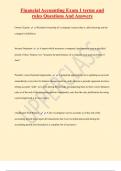Exam (elaborations)
Financial Accounting Exam 1 terms and rules Questions And Answers
- Course
- Institution
Financial Accounting Exam 1 terms and rules Questions And Answers Owner's Equity Residual ownership of a company's assets (that is, after factoring out the company's liabilities.) Income Statement A report which measures a company's performance over a specified period of time. Purpose is to...
[Show more]



